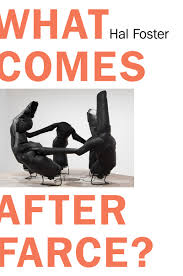Tim Griffin at Artforum:
 SURVEYING OUR CULTURAL LANDSCAPE through the prepositional prism of after is hardly a new approach among critics and historians writing on art during the past quarter century. Yet, as articulated in the title of Hal Foster’s new book, the premise is newly intriguing for being tethered to—and eclipsed in blunt rhetorical force by—the sad comedy of “farce.” Here Foster borrows the term from Marx’s famous adage regarding the French bourgeoisie’s willingness in 1851 to cede democratic values to a second Bonaparte emperor some fifty years after the first—a scenario that resonates strongly with our circumstances today, Foster suggests, insofar as Donald Trump’s arrival on the American scene must be understood not as a singularity but rather as another iteration of the authoritarian impulses that originally took root in the wake of 9/11. If “alternative facts” and conspiracy theories now flourish along the banks of the mainstream, they first needed the rich soil fertilized by the nationalist kitsch proffered at the start of the second Iraq war. To bolster his point, Foster cites novelist Milan Kundera’s observation that “in the realm of totalitarian kitsch all answers are given in advance and preclude any questions,” adding that such an epistemology met the fuel of populist affect at the dawn of the 2000s.
SURVEYING OUR CULTURAL LANDSCAPE through the prepositional prism of after is hardly a new approach among critics and historians writing on art during the past quarter century. Yet, as articulated in the title of Hal Foster’s new book, the premise is newly intriguing for being tethered to—and eclipsed in blunt rhetorical force by—the sad comedy of “farce.” Here Foster borrows the term from Marx’s famous adage regarding the French bourgeoisie’s willingness in 1851 to cede democratic values to a second Bonaparte emperor some fifty years after the first—a scenario that resonates strongly with our circumstances today, Foster suggests, insofar as Donald Trump’s arrival on the American scene must be understood not as a singularity but rather as another iteration of the authoritarian impulses that originally took root in the wake of 9/11. If “alternative facts” and conspiracy theories now flourish along the banks of the mainstream, they first needed the rich soil fertilized by the nationalist kitsch proffered at the start of the second Iraq war. To bolster his point, Foster cites novelist Milan Kundera’s observation that “in the realm of totalitarian kitsch all answers are given in advance and preclude any questions,” adding that such an epistemology met the fuel of populist affect at the dawn of the 2000s.
more here.
